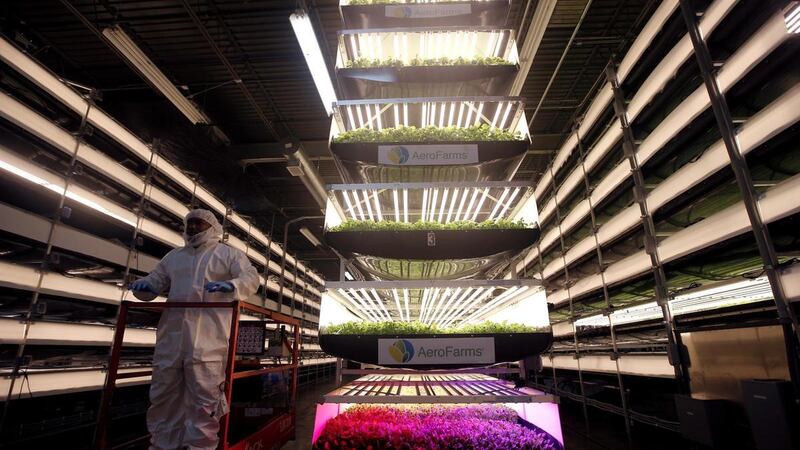The UAE is set to establish a "Silicon Valley" of food technology in an effort to meet the country's growing food security needs, the food minister has said.
Mariam Hareb Almheiri, Minister of State for Future Food Security, said the issue represents a huge challenge for the region and the world.
Unstable global markets as well as inflation remain a significant threat to the price of everyday food. But emerging technologies such as vertical farming and hydroponics are helping experts address those concerns, reducing both soaring consumer and environmental costs.
Speaking in a radio interview on Dubai Eye 103.8, Ms Almheiri said the country was well aware of the challenges ahead and was taking steps to protect food prices and encourage sustainability.
“We are living in an era of increased pressures on food production stemming from a host of interlocking challenges, including accelerating climate change, dwindling fresh water access and escalating energy demands,” she said.
“Providing adequate food for the world’s citizens is a global problem and one that is likely to become more pressing in the coming decades.”
The challenges of ensuring adequate food supply was the subject under discussion at a series of workshops held last month by the UAE Office for Future Food Security.
The sessions examined several potential global scenarios for the year 2050, and analysed how these might affect the provision of sustenance for the region’s growing population.
Given both unstable global supply chains and climate-driven disruption of agricultural production, food and water security have become central strategic challenges.
Ms Almheiri said plans for a food equivalent of Silicon Valley in the UAE were currently under review, with the aim of bringing together public and private bodies to boost research and improve existing technology.
“A UAE national plan is being worked on as part of the future food security file that includes advancing research and adopting technologies,” she said.
“We are trying to create the equivalent of Silicon Valley - but with food, by bringing together research institutes, universities, academia and the private sector.
“The aim is to understand what everyone is doing on food security and how someone from the outside can access data to push research and development.”
__________________
Read more:
[ How fruit and veg grown in vertical farms could soon be on plates in the Middle East ]
Dubai government agrees on deal to start up 12 vertical farms in the city
Emirates to build Dh147m vertical farming factory near Dubai airport to produce food for passengers
_________________
The first vertical farms are expected to involve a public and private partnership with the Emirates Flight Catering group.
A second, $40 million (Dh147m) joint venture with Crop One Holdings - a leading vertical farm operator based in the US - is also in the pipeline to build the world’s largest vertical farm in the Dubai.
It will produce 2.7 tonnes of greens and micro-greens to help supplier EFC with its 250,000 required meals a day.
The farms can be located anywhere because temperature, humidity, light, water and plant nutrients are all provided in a controlled environment. Plants are grown entirely without soil, with nutrient-rich solutions that produce fast-growing, healthy plants used instead.
The UAE's National Food Security Strategy, which will set sustainable, long-term policies for future food security, is scheduled for launch in September.
“Adapting our diet could help preserve food security in future,” Ms Almheiri said.
“Developing a nutritional standard for all UAE citizens will help us understand the needs of how to lead a healthier lifestyle.
“Once that is in place we can guide consumers towards the better foods to eat for a better quality of life.
“We’ll start with a food label system, that is being developed with the minister of state for happiness and well-being, so consumers can choose their foods wisely.
“This will look at sugars, fats and calories with red being bad, orange in moderation and green a heathy indicator.
“The next step could be not allowing red labelled foods in schools, or stopping additives from being added to foods.”







